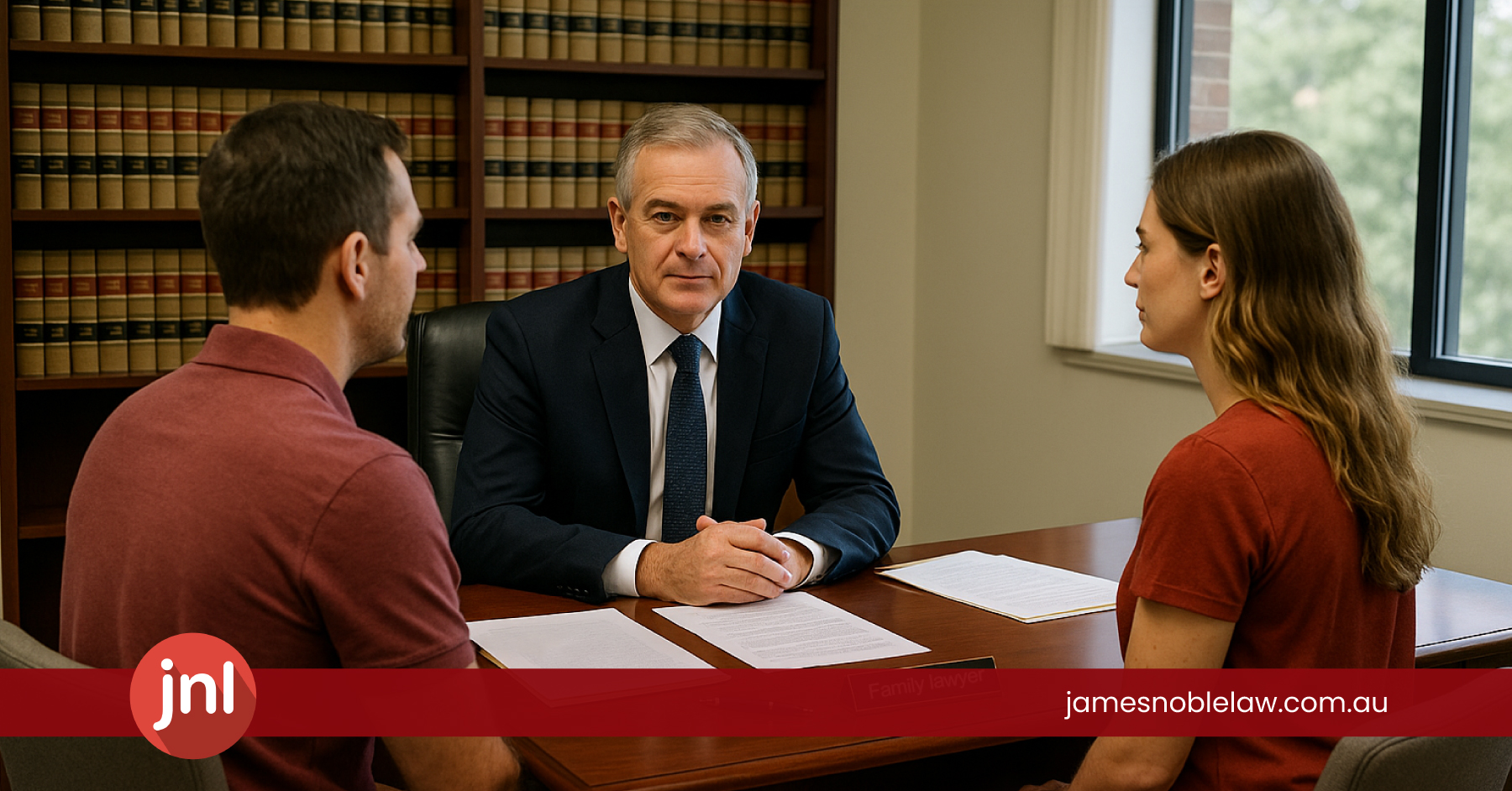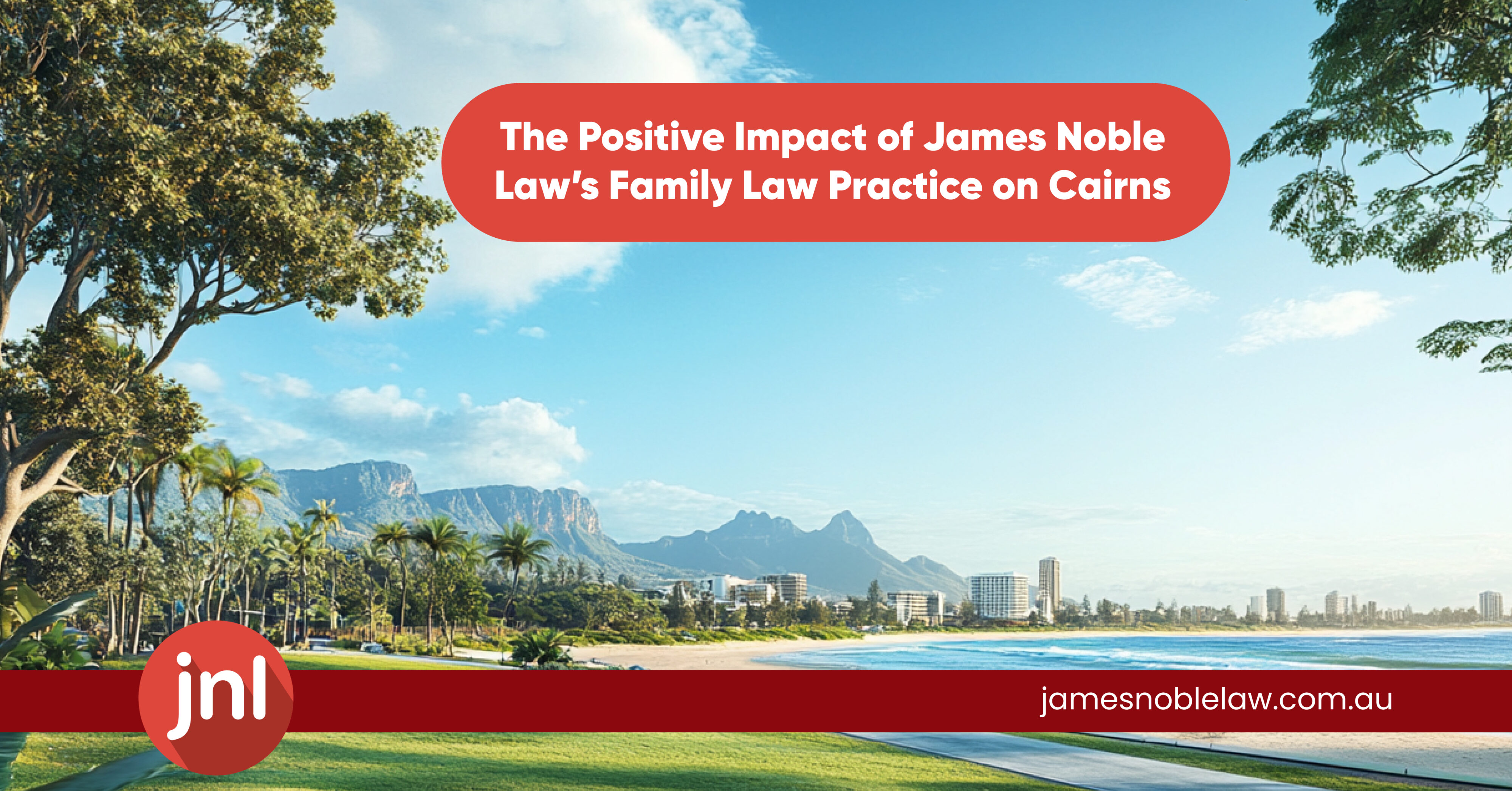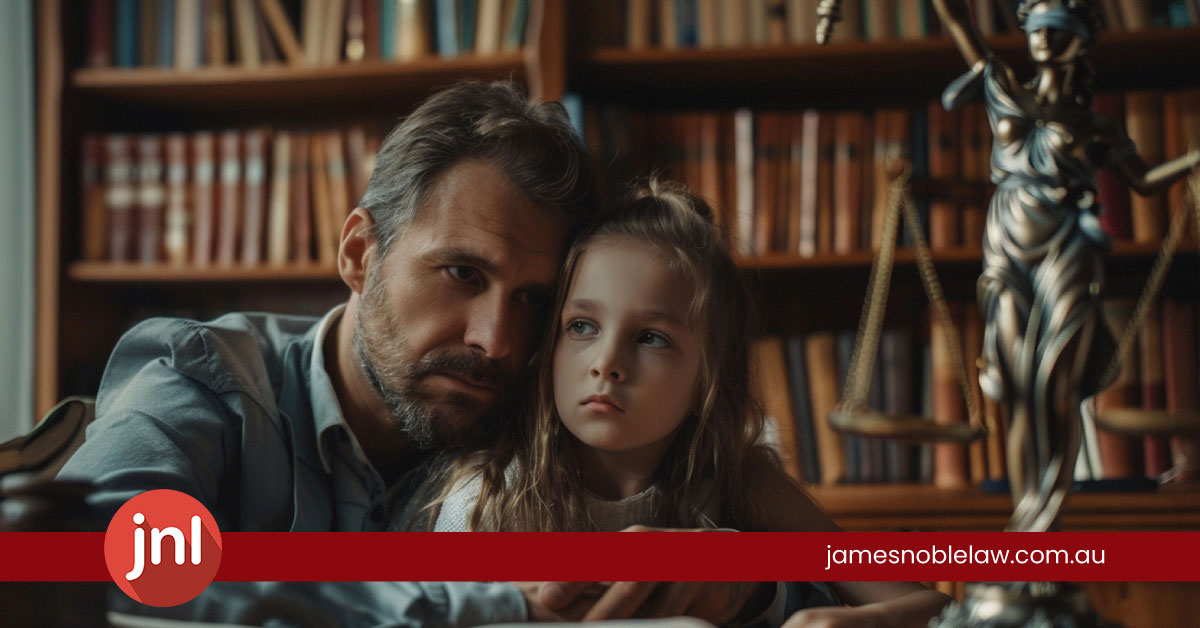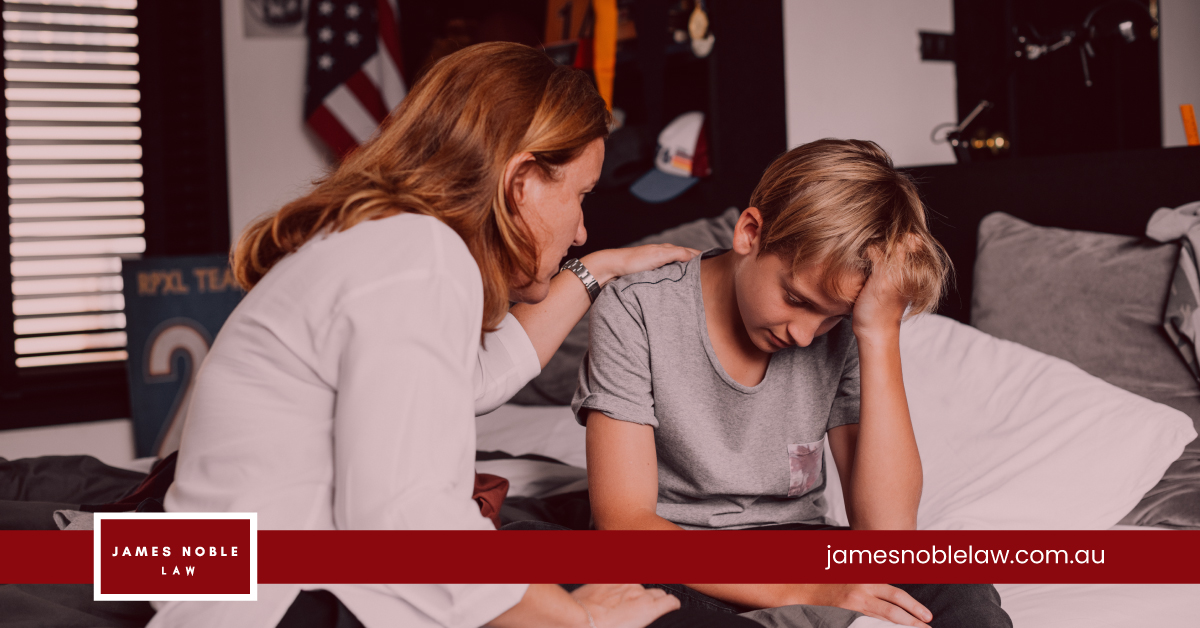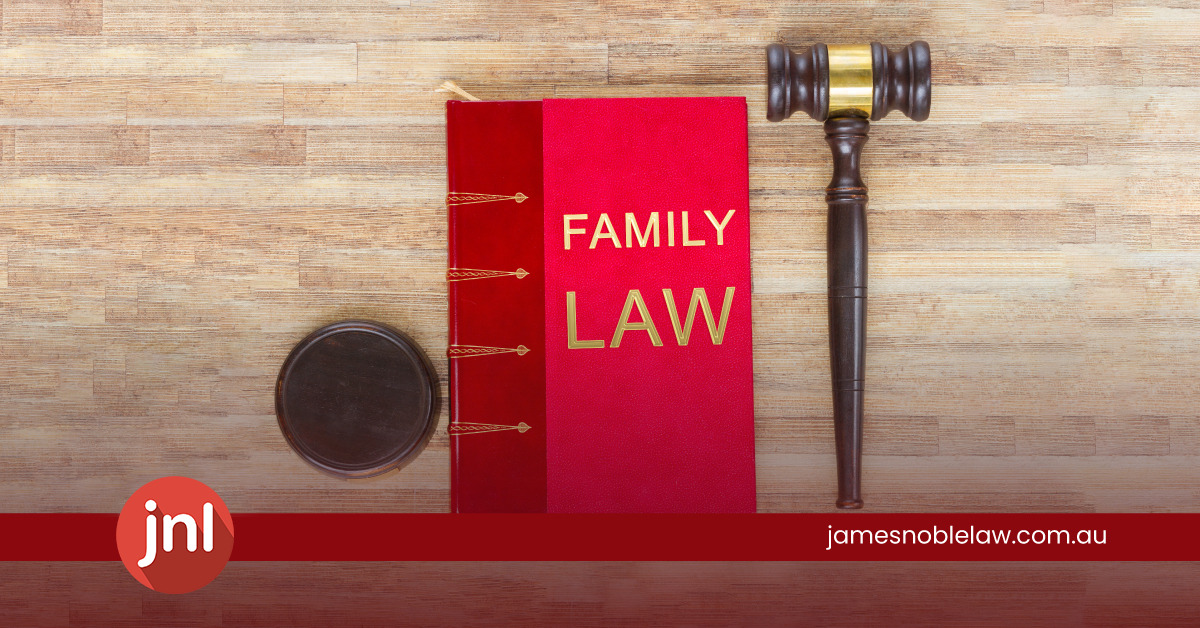Court Forms Without the Chaos: James Noble Law Takes the Complexity Out of Family Law
When Paperwork Feels Like a Legal Minefield If you're in the middle of a family dispute, separation, or child custody matter, chances are you're already feeling emotionally drained. Then come the court forms— filled with unfamiliar language, legal traps, and intimidating deadlines to overwhelm even the most organised person. But you don’t have to face it alone. Having a trusted family lawyer by your side isn’t just about legal advice—it’s about peace of mind. At James Noble Law, we help...
Read More
The Positive Impact of James Noble Law’s Family Law Practice on Cairns, Queensland
Cairns, Queensland, is renowned for its breathtaking natural beauty, vibrant community, and thriving economy. With the recent establishment and operation of James Noble Law's Family Law Practice in Cairns, this picturesque region stands to gain even more from the expertise and dedication that this legal practice brings. In this article, we'll explore the various benefits that this expansion offers to the Cairns area and its surrounds. [caption id="attachment_18632" align="alignright" width="350"] James noble[/caption] Expertise and Experience: James Noble Law is a...
Read More
Litigation Funding Orders: Ensuring Fairness in Legal Proceedings
Litigation funding orders play a critical role in ensuring procedural fairness in legal proceedings, particularly where an imbalance of financial resources between the parties exists. These orders are designed to address situations where one party, often in control of substantial assets, is able to fund legal representation while the other is left at a disadvantage. By allowing access to resources that might ultimately be distributed in property settlements, litigation funding orders aim to level the playing field. This text explores...
Read More
Navigating Paternity Determination in Brisbane, Queensland: Understanding the Legal Framework
Paternity Determination in Brisbane In Brisbane, Queensland, determining paternity in family law cases involves a complex process guided by the Family Law Act 1975 (Cth). Central to this process is the presumption of paternity, which can arise from various circumstances such as marriage, cohabitation, registration of birth, court findings, signed acknowledgments of paternity, and artificial conception. [caption id="attachment_17925" align="alignright" width="350"] Paternity Determination in Brisbane[/caption] However, this presumption is not absolute and can be rebutted through evidence presented on the balance...
Read More
Navigating Grandparents Legal Rights: A Guide to Visitation and Custody Cases in Cairns
The bond between grandparents and their grandchildren is often a source of love, support, and continuity within a family. However, there are instances when grandparents find themselves facing challenges in maintaining this connection, especially during divorce or separation proceedings. In Cairns, as in many other places, understanding the legal rights of grandparents in visitation and custody cases is crucial for ensuring the well-being of both grandparents and grandchildren. Visitation Rights for Grandparents [caption id="attachment_17724" align="alignright" width="350"] Grandparents Legal Rights in...
Read More
Legal Landscape for De Facto and Same-Sex Couples in Cairns
In Cairns, as in the rest of Australia, the legal landscape has evolved to recognise the diverse nature of modern relationships, including de facto relationships and those involving same-sex couples. Understanding the rights, responsibilities, and legal aspects of these unions is essential. In this blog, we will explore de facto relationships and the recognition of same-sex couples in Cairns, Australia. De Facto Relationships in Cairns [caption id="attachment_17664" align="alignright" width="350"] De Facto Relationships Cairns[/caption] A de facto relationship is a domestic...
Read More
Sex work in Queensland: the regulations and the impact on children
The movement around the decriminalisation of sex work in Queensland advocates for the legal recognition of sex work as work, rather than a crime. In March 2023, the Queensland Law Report Commission proposed a range of amendments to the current sex work regulations in Queensland with the aim of reducing stigma and prejudice that currently taints the industry. Briefly, the ALRC Report proposed that by amending the current regulations surrounding sex work to reflect more modern sentiments, a sex work...
Read More
Impact of Recent Family Law Changes on Cairns Residents
Changes in Family Law Affecting Cairns Residents Family law is a dynamic and ever-evolving field, with regular changes and updates that can significantly impact individuals and families. Cairns, a beautiful city in Queensland, Australia, is no exception to these changes. Recent developments in family law have brought about several important modifications that Cairns’ residents should be aware of. In this blog, we will explore some of the key changes in family law that affect Cairns residents and how these changes...
Read More
Relationship Between a Child and an Independent Children’s Lawyer (ICL) in Family Law
Professional Relationship between a Child and an ICL The child has a right to establish a professional relationship with the ICL. In considering any views expressed by the child and the steps to be taken in a matter the ICL is to be aware: that each child will have different emotional, cognitive and intellectual developmental levels, family structures, family dynamics, sibling relationships, religious and cultural backgrounds; and that children are vulnerable to external pressures when caught in disputes involving their...
Read More
Navigating Family Law in Later Life Relationships
What Happens If One Party Goes into Aged Care? [caption id="attachment_16637" align="alignright" width="300"] Family Law in Later Life Relationships[/caption] The High Court decision in the case of Fairbairn v Radecki [2022] HCA 18, is relevant in considering how a settlement might occur if one party were to enter aged care. The facts of Fairbairn v Radecki are as follows: The female appellant and male responded were in a later life relationships commencing in 2010 in the state of New South...
Read More
Resolving Family Disputes : Your Path to Peaceful Resolutions
Family Dispute Resolution The merger of the courts on 1 September 2021 brought with it a shift in how family law cases proceed, with a greater emphasis on dispute resolution both before and during a proceeding, and new rules to facilitate that shift. See brochures: “Before you file – pre-action procedure for parenting cases” and “Before you file – pre-action procedure for financial cases” In both thee FCFCA and FCWA lawyers must assist their clients to comply with their duty...
Read More
The Principles Applicable to Sole Use and Occupation of the Matrimonial Home (Section 114(1) of the Family Law Act)
Matrimonial Home Principles which are Applicable to Sole Use and Occupation The principles to be applied in making an order for sole use and occupancy of the former matrimonial home pursuant to s 114(1) of the Act are to be understood in light of the observations about the general nature of the injunctive powers of this section of the Act. They may be summarised as follows: a) the Court may make such an order as it thinks proper; b) there are no words...
Read More
What is an Independent Children’s Lawyer (ICL)
Independent Children's Lawyer (ICL) [caption id="attachment_16543" align="alignright" width="350"] Independent Children's Lawyer[/caption] RELEVANT LAW The Family Court has inherent jurisdiction and hence power to control its own proceedings including the power to appoint and discharge an ICL. Such power is by its nature discretionary. Specifically, the power to appoint an Independent Children's Lawyer (ICL) is provided at s 68L of the Family Law Act 1975 (Cth) (“The Act”). Section 68LA sets out the role of the ICL as follows: 68LA...
Read More
Top five traits of a Female Narcisisst and what to look out for in a relationship
5 Key Traits of a Female Narcissist Narcissistic personality disorder (NPD) is a mental health condition characterized by a grandiose sense of self-importance, a need for admiration, and a lack of empathy. While both men and women can have NPD, research suggests that female narcissists may use different tactics than their male counterparts to get what they want. Here are five traits of a female narcissist to watch out for in a relationship. Self-absorption One of the hallmarks of NPD...
Read More
Top 5 Traits of a Male Narcissist and What to look out for in a Relationship
5 Key Traits of a Male Narcissist Narcissistic Personality Disorder (NPD) is a mental condition characterized by a grandiose sense of self-importance, a need for excessive admiration, and a lack of empathy toward others. Men with NPD can be charming and charismatic, but they can also be emotionally abusive and damaging in relationships. Here are five traits of a male narcissist to watch out for in a relationship. Extreme self-centeredness: A male narcissist's primary focus is on himself, and he...
Read More
Legal costs in family law proceedings
Legal Costs in family law proceedings: Overview and Legal Framework [caption id="attachment_16375" align="alignright" width="350"] Legal Costs in family law proceedings: Overview and Legal Framework[/caption] The law relating to costs in family law proceedings is well settled and set out in detail in the Full Court decision of Parke & The Estate of the Late A Parke. General Presumption and Exceptions An application for costs is governed by s 117 of the Family Law Act 1975 (Cth) (“the Act”). Section 117(1) of the Act sets out the...
Read More
Property proceedings – Assessment of a party’s interest in matrimonial property
Property proceedings - Family Court of Australia - Full Court [caption id="attachment_11763" align="alignright" width="350"] Property proceedings - Family Court of Australia - Full Court[/caption] Barnell & Barnell [2020] FamCAFC 102 This case looked at the principles relevant to the assessment of contributions determining property proceedings pursuant to s 79 of the Family Law Act 1975 Applicable principles It is well-settled by the authority that the assessment of contributions under s 79 of the Act is not a mathematical exercise. Evaluating Disparate Contributions Contribution, either direct...
Read More
Interim Spousal Maintenance | The Law Concepts and Principles
INTERIM SPOUSAL MAINTENANCE The law – concepts and principles Section 74(1) of the Family Law Act empowers the Court to “make such order as it considers proper for the provision of maintenance” in accordance with Pt VIII of the Act. That primary requirement is set out in s 72(1) of the Act, as follows: (1) A party to a marriage is liable to maintain the other party, to the extent that the first-mentioned party is reasonably able to do so,...
Read More
Property issues in a de facto relationship
Property issues in a de facto relationship Australia The Family Court of Australia has jurisdiction under the Family Law Act 1975 (Cth) (“the Act”) to determine matters relating to property as between parties who have not been married, where the parties have lived in a de facto relationship for a period of no less than two years and the relationship finally ended after 1 March 2009, the date on which the particular provisions of the Act commenced. The touchstone or foundational...
Read More
Consent Orders in Family Law Matters
Consent Orders in Family Law Matters - Australia According to the information provided by Adam Cooper in a paper he has delivered. Consent orders are a very useful means of obtaining orders from the Family Court in regard to property and children's matters. Consent orders carry many advantages, including the exemption in property matters for roll-over stamp duty and capital gains tax. Being an economical and less invasive means of resolution, an ability to divide superannuation interests between the parties,...
Read More


